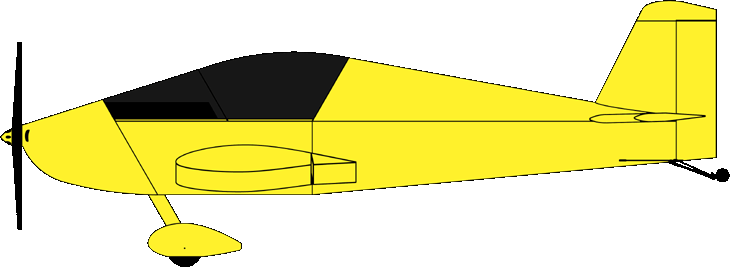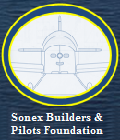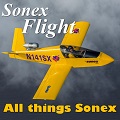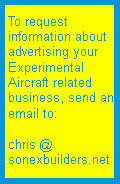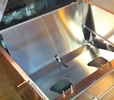

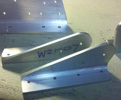
random user submitted photo
Stall/spin accidents in our community
27 posts
• Page 2 of 3 • 1, 2, 3
Re: Stall/spin accidents in our community
lpaaruule wrote:I couldn't help but run the numbers on 40mph crash vs stalling at 30 feet.
One thing you didn't consider is the angle of the impact. In a stall/spin, the impact is usually vertical, whereas if you're flying the airplane into the ground at the same speed, the impact will be at an angle. And if you're in control of the airplane you will be able to have some control over that angle of impact. So even though the speed may be the same, the energy dissipation will be spread out over a much longer time with an angular impact as opposed to the vertical. It does make a difference.
Joe Norris
Sonex N208GD (S/N 450)
Sonerai II N13NN (S/N 1206)
Fortes Fortuna Adiuvat
Sonex N208GD (S/N 450)
Sonerai II N13NN (S/N 1206)
Fortes Fortuna Adiuvat
-

Sonerai13 - Posts: 415
- Joined: Tue Nov 05, 2013 5:36 pm
- Location: Oshkosh, WI
Re: Stall/spin accidents in our community
Hi Joe,
Thanks for your comment. I understand what you are saying, and had considered it. Even in a car, the hope would be that you wouldn't run into the back of another vehicle that's standing still. I was only considering worst case, like we've seen automakers do when they send a vehicle into a solid wall.
Unless a plane is stalled, the angle of impact with the earth should be low. If it's low enough, I call it a landing. The things sticking up from the earth at different angles is what I was considering.
I absolutely agree that flying the airplane and avoiding objects, or hitting them at an angle is preferable to a straight in impact.
Thanks for your comment. I understand what you are saying, and had considered it. Even in a car, the hope would be that you wouldn't run into the back of another vehicle that's standing still. I was only considering worst case, like we've seen automakers do when they send a vehicle into a solid wall.
Unless a plane is stalled, the angle of impact with the earth should be low. If it's low enough, I call it a landing. The things sticking up from the earth at different angles is what I was considering.
I absolutely agree that flying the airplane and avoiding objects, or hitting them at an angle is preferable to a straight in impact.
Paul LaRue
Sonex N454EE Plans# 1509
Jabiru 3300
First Flight 12/21/2017
http://www.mykitlog.com/lpaaruule
Sonex N454EE Plans# 1509
Jabiru 3300
First Flight 12/21/2017
http://www.mykitlog.com/lpaaruule
-

lpaaruule - Posts: 233
- Joined: Wed Mar 26, 2014 6:33 pm
- Location: SE Michigan
Re: Stall/spin accidents in our community
I agree with the slow flight, best glide, AOA, training. I have experienced a cylinder loss in my Onex Aerovee (fouled plugs) and it will maintain altitude on three cylinders, at 2000 rpm, running rough, and you can milk out a 50-100 fpm climb at 60-70 mph. But it's a very sensitive situation. A 30 degree turn would put you near stall speed.
OneX 107
N2107X
N2107X
- Onex107
- Posts: 506
- Joined: Mon Mar 24, 2014 6:44 pm
- Location: Peoria, IL
Re: Stall/spin accidents in our community
I'd like to add one more thing. The AOA in my Onex cost about $65.00. It doesn't light up, it doesn't talk to you, and it doesn't need 12 volts and a fuse. You can make one yourself. The plans are available on the internet. No voltage required, and you can calibrate it for flaps or no flaps by setting the angle of the probe, mounted on an inspection plate next to the pitot. All You have to purchase is the differential pressure gage. Mine is calibrated in Green, Yellow, and Red zones. The red zone starts at 45 mph. It's within my sight zone while landing and I have come to rely on It during final approach. Short final airspeed is in the Yellow range. I don't have to look at the airspeed indicator or GPS when my eyes should be outside. It's mounted on top of the panel down in the corner on the left side where the windshield meets the panel. A couple of pieces of 1/4 aluminum, a differential pressure gage, and a few feet of plastic tubing and you have a functioning AOA.
OneX 107
N2107X
N2107X
- Onex107
- Posts: 506
- Joined: Mon Mar 24, 2014 6:44 pm
- Location: Peoria, IL
Re: Stall/spin accidents in our community
Hi all,
For our second waiex, i ordered the lift pressure gauge and dynon pitot tubing kit from spruce. Will go on the left side of panel right in front of me. I agree , keep it seperate and simple, no electricty , wires, fuses, etc. it will always work with just air pressure.
WaiexN143NM
Michael
For our second waiex, i ordered the lift pressure gauge and dynon pitot tubing kit from spruce. Will go on the left side of panel right in front of me. I agree , keep it seperate and simple, no electricty , wires, fuses, etc. it will always work with just air pressure.
WaiexN143NM
Michael
- WaiexN143NM
- Posts: 1206
- Joined: Mon Sep 15, 2014 1:04 am
- Location: palm springs CA
Re: Stall/spin accidents in our community
I think it was Bob Hoover who recommended maintaining airspeed so you can fly the airplane as far as possible into the crash. When you stall close to the ground, you become a passenger. It is better to fly onto or into something than to loose control! Trees? Guide the fuselage between and let the wings come off as they absorb energy slowing down the fuselage. Having enough airspeed to flare and stop the descent when landing off airport is so much better than trying to stretch the glide and stalling and hitting hard.
- N190YX
- Posts: 80
- Joined: Thu Jun 26, 2014 7:01 pm
Re: Stall/spin accidents in our community
Unfortunately, Stall /spin accidents are the single largest cause of fatalities in general aviation... PERIOD!!!.. No one can know nor can the NTSB know for sure in the end, BUT, the fact is that the "Human Factor" is the least understood and most dangerous thing we face as pilots. When everything is going to hell in the cockpit, it takes us 5 times as long to react and our ability to maintain clear thought and do all of the right things to safely get to the ground is exponentially more difficult. This is why if you evaluate NTSB accident reports, even when engine failures occur, they always cite that the pilot failed to maintain controlled flight to the ground (paraphrasing). As we all know, airplanes don't fall out of the sky nor do they hit immovable objects without guidance from the pilot. The best way to force yourself to learn these things is to practice slow flight and if possible, practice engine outs as much as you can and understand what the airplane is telling you. Experience and training (to include self training/practice) will aid you in using rote memory to overcome things in a more automatic fashion.
If you evaluate stall/spin accidents, to include hitting immovable objects, you will generally find that better options for where to put the plane down were available and but for the "Human factor" and our inability to process the situation with little if any time to spare, most are survivable. In the end, we have to NEVER stop flying the airplane since as long as it is flying, we have some control overt the situation. Trying to push the aircraft beyond Bernoulli's principle (available LIFT) in hopes of making it one foot further forward than the airplane can fly, only hastens the speed at which we hit the ground or immovable objects.
Personally I'd rather land on a moving car or in tree tops or anywhere else that won't create a sudden stop. Touching down at less angle and at or just above stall speed is the name of the game. We have to become the best energy managers that we can be and know that no matter what, the Human Factor and lack of experience will more than likely make us a statistic for which we cannot survive.
And for the record, I have survived one complete engine out that resulted in an off airport landing and a partial engine out that was nursed to the next airport. I am sure that other here can reflect on similar incidents. Had I been a low time pilot during either of my incidents, I likely would not have fared so well.
This is an important discussion that we should never be afraid to have, here, or anywhere else. I hope this doesn't offend anyone but if so, so be it
If you evaluate stall/spin accidents, to include hitting immovable objects, you will generally find that better options for where to put the plane down were available and but for the "Human factor" and our inability to process the situation with little if any time to spare, most are survivable. In the end, we have to NEVER stop flying the airplane since as long as it is flying, we have some control overt the situation. Trying to push the aircraft beyond Bernoulli's principle (available LIFT) in hopes of making it one foot further forward than the airplane can fly, only hastens the speed at which we hit the ground or immovable objects.
Personally I'd rather land on a moving car or in tree tops or anywhere else that won't create a sudden stop. Touching down at less angle and at or just above stall speed is the name of the game. We have to become the best energy managers that we can be and know that no matter what, the Human Factor and lack of experience will more than likely make us a statistic for which we cannot survive.
And for the record, I have survived one complete engine out that resulted in an off airport landing and a partial engine out that was nursed to the next airport. I am sure that other here can reflect on similar incidents. Had I been a low time pilot during either of my incidents, I likely would not have fared so well.
This is an important discussion that we should never be afraid to have, here, or anywhere else. I hope this doesn't offend anyone but if so, so be it
Chris Schuldt
703-928-5199
BRM Aero Bristell NG-5
"B" model Conversion Waiex s/n 64 4th owner, kit from 2007
Edge Performance 915-ECi 120 HP EFI with Ring Mount
Rotax iRMT Service
Rotax iRMT Maintenance
Rotax iRMT Heavy Maintenance
703-928-5199
BRM Aero Bristell NG-5
"B" model Conversion Waiex s/n 64 4th owner, kit from 2007
Edge Performance 915-ECi 120 HP EFI with Ring Mount
Rotax iRMT Service
Rotax iRMT Maintenance
Rotax iRMT Heavy Maintenance
- Ercoupechris
- Posts: 71
- Joined: Sat Nov 07, 2015 12:02 am
Re: Stall/spin accidents in our community
I've had two engine outs. I have an analog LRI (lift reserve indicator) gauge (AOA) that is mechanically/steam driven. It sits right in front of me. I think its saved my life and my plane. In both situations, I used that gauge to get me back on the ground. However, it takes discipline to fly to it. If you lose your head, and panic or get distracted, an LRI ain't gonna do nothing for you. But if you can keep you head, keep the plane flying in the safe zone (the LRI will tell you that), you will land at a controllable and slow speed. Not to say it won't be in the roof of a condo complex or in the case of my last landing, a frozen pasture.
John Gillis
SEL Private, Comm Glider, Tow pilot (Pawnee Driver)
Waiex N116YX, Jabiru 3300, Tail dragger,
First flight, 3/16/2013. 403 hours and climbing.
Home: CO15. KOSH x 5
Flying a B-Model Conversion (Super Bee Baby!)
-

fastj22 - Posts: 1594
- Joined: Sun Aug 21, 2011 5:56 pm
- Location: Mile High
Re: Stall/spin accidents in our community
I agree with you John but flying for Vglide is also a good tool, gotta watch airspeed. In fact in the absence of Lift Reserve indication, I would be (and have been) scanning between the ASI (Vglide) and where you're going to put it down. I agree though that if you have LR its great but if not, there are other options. No substitute for good energy management and making realistic choices on where you want to crash land.
Chris Schuldt
703-928-5199
BRM Aero Bristell NG-5
"B" model Conversion Waiex s/n 64 4th owner, kit from 2007
Edge Performance 915-ECi 120 HP EFI with Ring Mount
Rotax iRMT Service
Rotax iRMT Maintenance
Rotax iRMT Heavy Maintenance
703-928-5199
BRM Aero Bristell NG-5
"B" model Conversion Waiex s/n 64 4th owner, kit from 2007
Edge Performance 915-ECi 120 HP EFI with Ring Mount
Rotax iRMT Service
Rotax iRMT Maintenance
Rotax iRMT Heavy Maintenance
- Ercoupechris
- Posts: 71
- Joined: Sat Nov 07, 2015 12:02 am
Re: Stall/spin accidents in our community
Ercoupechris wrote:When everything is going to hell in the cockpit, it takes us 5 times as long to react and our ability to maintain clear thought and do all of the right things to safely get to the ground is exponentially more difficult.
this is the truth! I spoke to a gentleman many years ago, who had survived a stall/spin accident in his homebuilt. He had an engine failure and went down in trees. He told me that he KNEW he shouldn't be pulling back on the stick, but he just couldn't stop himself as the trees got closer. This is how our mind reacts. We have to train, train, train to instill the proper response to emergencies. Unfortunately, no training can simulate the rush of Adrenalin that will happen when the trees (or rocks, or whatever) get close and the whole thing is for real. But good training will help to alleviate the anxiety of the moment. Training, and recurrent training, is the key!
Be safe folks!!
Joe Norris
Sonex N208GD (S/N 450)
Sonerai II N13NN (S/N 1206)
Fortes Fortuna Adiuvat
Sonex N208GD (S/N 450)
Sonerai II N13NN (S/N 1206)
Fortes Fortuna Adiuvat
-

Sonerai13 - Posts: 415
- Joined: Tue Nov 05, 2013 5:36 pm
- Location: Oshkosh, WI
27 posts
• Page 2 of 3 • 1, 2, 3
Who is online
Users browsing this forum: No registered users and 25 guests
